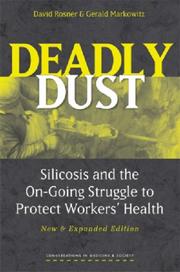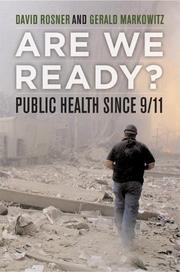| Listing 1 - 3 of 3 |
Sort by
|

ISBN: 0472031104 9780472031108 Year: 2006 Publisher: Ann Arbor: University of Michigan press,
Abstract | Keywords | Export | Availability | Bookmark
 Loading...
Loading...Choose an application
- Reference Manager
- EndNote
- RefWorks (Direct export to RefWorks)
During the Depression, silicosis, an industrial lung disease, emerged as a national social crisis. Experts estimated that hundreds of thousands of workers were at risk of disease, disability, and death by inhaling silica in mines, foundries, and quarries. By the 1950s, however, silicosis was nearly forgotten by the media and health professionals. Asking what makes a health threat a public issue, David Rosner and Gerald Markowitz examine how a culture defines disease and how disease itself is understood at different moments in history. They also explore the interlocking relationships of public health, labor, business, and government to discuss who should assume responsibility for occupational disease.

ISBN: 1282360167 9786612360169 0520940474 9780520940475 9781282360167 0520249208 0520250389 9780520249202 9780520250383 661236016X Year: 2006 Publisher: CA University of California Press
Abstract | Keywords | Export | Availability | Bookmark
 Loading...
Loading...Choose an application
- Reference Manager
- EndNote
- RefWorks (Direct export to RefWorks)
A contemporary history of a critical period, Are We Ready? analyzes the impact of 9/11, the anthrax attacks that followed, and preparations for a possible smallpox attack on the nation's public health infrastructure. David Rosner and Gerald Markowitz interviewed local, state, and federal officials to determine the immediate reactions of key participants in these events. The authors explore the extent to which these emergencies permanently altered the political, cultural, and organizational life of the country and consider whether the nation is now better prepared to withstand another potentially devastating attack. This well-reasoned and well-researched book presents compelling evidence that few with hands-on experience with disease and emergency preparedness believe that an adequate response to terrorism-whether biological, chemical, or radiological-is possible without a strong and vibrant infrastructure to provide everyday services as well as emergency responses. Are We Ready? begins with an examination of the experiences of local New York officials who were the first responders to 9/11 and follows them as events unfolded and as state and national authorities arrived. It goes on to analyze how various states dealt with changing federal funding for a variety of public health services. Using oral histories of CDC and other federal officials, the book then focuses on the federal reaction to 9/11 and anthrax. What emerges is a picture of dedicated public servants who were overcome by the emotions of the moment yet who were able to react in ways that significantly reduced the public anxiety and public health threat. Despite the extraordinary opportunity to revitalize and reinvigorate the nation's public health infrastructure, the growing federal and state budget deficits, the refocusing of national attention on the war in Iraq, and the passage of time all combined to undermine many of the needed reforms to the nation's public health defenses.Copub: Milbank Memorial Fund
Medical policy --- Emergency medical services --- Emergency management --- September 11 Terrorist Attacks, 2001 --- Health aspects
Book
ISBN: 0520954955 9780520954953 1299192394 9781299192393 9780520273252 0520273257 Year: 2013 Publisher: Berkeley New York
Abstract | Keywords | Export | Availability | Bookmark
 Loading...
Loading...Choose an application
- Reference Manager
- EndNote
- RefWorks (Direct export to RefWorks)
In this incisive examination of lead poisoning during the past half century, Gerald Markowitz and David Rosner focus on one of the most contentious and bitter battles in the history of public health. Lead Wars details how the nature of the epidemic has changed and highlights the dilemmas public health agencies face today in terms of prevention strategies and chronic illness linked to low levels of toxic exposure. The authors use the opinion by Maryland's Court of Appeals-which considered whether researchers at Johns Hopkins University's prestigious Kennedy Krieger Institute (KKI) engaged in unethical research on 108 African-American children-as a springboard to ask fundamental questions about the practice and future of public health. Lead Wars chronicles the obstacles faced by public health workers in the conservative, pro-business, anti-regulatory climate that took off in the Reagan years and that stymied efforts to eliminate lead from the environments and the bodies of American children.
Lead poisoning --- Lead poisoning in children --- Childhood lead poisoning --- Pediatric toxicology --- Lead intoxication --- Plumbism --- Saturnism --- Lead --- Poisoning --- History. --- Prevention --- Government policy --- Toxicology --- 20th century. --- america. --- american children. --- chronic illness. --- environmental sciences. --- epidemiology. --- experiments. --- health and wellness. --- health policies. --- historical. --- human condition. --- lead poisoning. --- legal conflicts. --- nonfiction. --- poisoning epidemic. --- political. --- politics of science. --- public health agencies. --- public health workers. --- public health. --- reagan administration. --- retrospective. --- social historians. --- toxic exposure. --- unethical research. --- us history.
| Listing 1 - 3 of 3 |
Sort by
|

 Search
Search Feedback
Feedback About UniCat
About UniCat  Help
Help News
News